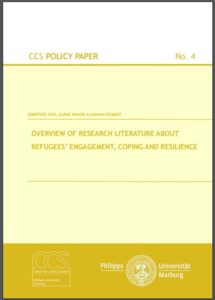We recently prepared a literature overview about Refugees’ Engagement, Coping and Resilience.  Fees, Dorothee, Krause, Ulrike und Schmidt, Hannah (2016), ‘Overview of Research Literature about Refugees’ Engagement, Coping and Resilience‘, CCS Policy Paper, Nr. 4.
Fees, Dorothee, Krause, Ulrike und Schmidt, Hannah (2016), ‘Overview of Research Literature about Refugees’ Engagement, Coping and Resilience‘, CCS Policy Paper, Nr. 4.
Introduction: Since the 1980s, a growing body of academic literature has shed light on various questions about forced migration through international case studies or theoretical analyses. With a focus on the refugee regime, numerous studies explore what humanitarian agencies and nation states can do or are doing to provide security and assistance for refugees. Despite their protection mandate and global efforts, this focus leaves refugees as vulnerable objects of the system, ignores their diverse social, cultural, economic and political backgrounds, interests and abilities, and eventually presents them as passive and homogeneous masses. Moreover, it neglects how refugees proactively engage in improving their living conditions, although, as Gaim Kibreab phrased it already in 1993, “refugees were […] imaginative, resourceful and industrious”. In recent years, scholars in Forced Migration and Refugee Studies have directed their research attention increasingly towards refugees’ agency, engagement and coping strategies, illustrating refugees as political subjects, economic contributors and security providers. It is this discourse that the research project Global Refugee Protection and Local Refugee Engagement. Scope and Limits of the Agency of Refugee-led Community-based NGOs at the Center for Conflict Studies, Marburg University aims to contribute to. The project is funded by the Gerda Henkel Stiftung and includes case studies in Uganda. Our interest lies in agency exercised by refugees, exploring how refugees cope with hardships, how they engage in protection and what roles social networks and refugee-led organisations play. As a point of departure, we have developed this overview of existing studies on refugees’ engagement, coping and resilience. With a focus on Forced Migration and Refugee Studies, the below cited literature covers a wide spectrum of disciplines such as Political Sciences and International Relations, Sociology, Anthropology, Cultural Studies, Geography, and Neuropsychology as well as interdisciplinary fields including Development Studies, Gender Studies and Peace and Conflict Studies.
